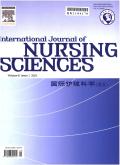Social alienation in patients with inflammatory bowel diseases: A latent profile analysis
IF 3.1
3区 医学
Q1 NURSING
引用次数: 0
Abstract
Objectives
The study aimed to explore social alienation types in patients with inflammatory bowel diseases (IBD) and identify influencing factors.
Methods
This cross-sectional study was conducted using purposive sampling among patients with IBD from July 2022 to July 2023. Patients were assessed using the Generalized Social Alienation Scale (GSAS), the Brief Illness Perception Questionnaire (B-IPQ), the Hospital Anxiety and Depression Scale (HADS), and the Medical Coping Modes Questionnaire (MCMQ). Demographic and disease-related characteristics were also collected. Latent profile analysis (LPA) was used to identify potential subgroups of social alienation. Univariate analysis and multicollinearity analysis were conducted to explore the influencing factors, followed by multiple regression analysis to evaluate the effect of influencing factors on social alienation.
Results
Three distinct profiles of social alienation were identified: integrated-low alienation group (n = 61, 20.20 %), accommodative-moderate alienation group (n = 195, 64.57 %), and maladaptive-high alienation group (n = 46, 15.23 %). Seven characteristics were associated with the profile’s membership: self-perceived financial stress, malnutrition risk, disease duration, illness comprehensibility, anxiety, depression, and acceptance-resignation coping mode.
Conclusions
Patients with IBD were categorized into three subgroups based on social alienation levels. Financial stress, malnutrition risk, disease duration, illness comprehensibility, anxiety, depression, and acceptance-resignation coping mode were key predictors of the subgroup membership. Targeted interventions should be developed to mitigate the negative effects of social alienation, with a focus on improving illness perception, alleviating anxiety and depression, and promoting effective coping strategies.
炎症性肠病患者的社会疏离感:一个潜在的分析
目的探讨炎症性肠病(IBD)患者的社会异化类型及其影响因素。方法对2022年7月至2023年7月IBD患者进行有目的抽样研究。采用广义社会异化量表(GSAS)、简易疾病感知量表(B-IPQ)、医院焦虑抑郁量表(HADS)和医疗应对方式问卷(MCMQ)对患者进行评估。还收集了人口统计学和疾病相关特征。运用潜在特征分析(LPA)识别潜在的社会异化亚群。通过单因素分析和多重共线性分析探讨影响因素,再通过多元回归分析评价影响因素对社会疏离感的影响。结果发现了3种不同的社会异化类型:综合-低异化组(n = 61, 20.20%)、适应性-中等异化组(n = 195, 64.57%)和适应不良-高异化组(n = 46, 15.23%)。7个特征与概况的成员相关:自我感知的财务压力、营养不良风险、疾病持续时间、疾病可理解性、焦虑、抑郁和接受-放弃应对模式。结论IBD患者根据社会疏离程度可分为3个亚组。经济压力、营养不良风险、疾病持续时间、疾病可理解性、焦虑、抑郁和接受-放弃应对模式是亚组成员的主要预测因素。应制定有针对性的干预措施,以减轻社会异化的负面影响,重点是改善对疾病的认识,减轻焦虑和抑郁,并促进有效的应对策略。
本文章由计算机程序翻译,如有差异,请以英文原文为准。
求助全文
约1分钟内获得全文
求助全文
来源期刊

International Journal of Nursing Sciences
Nursing-Nursing (all)
CiteScore
6.10
自引率
2.60%
发文量
408
审稿时长
25 days
期刊介绍:
This journal aims to promote excellence in nursing and health care through the dissemination of the latest, evidence-based, peer-reviewed clinical information and original research, providing an international platform for exchanging knowledge, research findings and nursing practice experience. This journal covers a wide range of nursing topics such as advanced nursing practice, bio-psychosocial issues related to health, cultural perspectives, lifestyle change as a component of health promotion, chronic disease, including end-of-life care, family care giving. IJNSS publishes four issues per year in Jan/Apr/Jul/Oct. IJNSS intended readership includes practicing nurses in all spheres and at all levels who are committed to advancing practice and professional development on the basis of new knowledge and evidence; managers and senior members of the nursing; nurse educators and nursing students etc. IJNSS seeks to enrich insight into clinical need and the implications for nursing intervention and models of service delivery. Contributions are welcomed from other health professions on issues that have a direct impact on nursing practice.
 求助内容:
求助内容: 应助结果提醒方式:
应助结果提醒方式:


